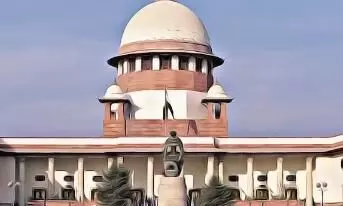
Restrictive clauses in laws cannot stop courts from granting bail: SC
text_fieldsNew Delhi: The Supreme Court said on Thursday that restrictive clauses in stringent penal statutes cannot stop courts from granting bail in the event of infringing Article 21 of the Constitution, which pertains to the protection of life and personal liberty.
A bench of Justices JB Pardiwala and Ujjal Bhuyan made the observation while granting bail to a man Sheikh Javed Iqbal from Nepal in a case under the Unlawful Activities Prevention Act, reported legal news website, Barandbench.
Sheikh Javed Iqbal has been accused of having involved in illegal trade of counterfeit Indian currency notes, PTI reported.
The anti-terrorist squad arrested Iqbal near the Sonauli border between India and Nepal in 2015 based on allegations that he possessed fake Indian currency notes of around Rs 23 lakh to Rs 26 lakh.
Iqbal was subsequently charged with the Unlawful Activities Prevention Act.
The counsel representing him told the court on Thursday that Iqbal spent more than 8 years in jail and there was no possibility of the criminal trial completing in near future.
Additional Advocate General Garima Prasad, representing Uttar Pradesh government, told the court that Iqbal being a foreign citizen was a flight risk and pointed out that the charges against him were serious.
However, granting the bail the court said that right to life and personal liberty enshrined in the Constitution is “overarching and sacrosanct”, according to the report.
‘A constitutional court cannot be restrained from granting bail to an accused on account of restrictive statutory provisions in a penal statute if it finds that the right of the accused-undertrial under Article 21 of the Constitution of India has been infringed,’ the court further said.
The bench said that “It would be very wrong to say that under a particular statute, bail cannot be granted,” adding, “It would run counter to the very grain of our constitutional jurisprudence.” The remarks of the bench are likely to have ramifications on scores of cases where UAPA provisions alone are treated as barring the grant of bail.
A sessions court in Lucknow rejected Iqbal’s first application seeking bail in 2016 and afterwards he approached the Allahabad High Court.
The High Court set aside proceedings against him under the anti-terrorism law on the grounds that it lacked required sanctions.
The High Court rejected his bail petition in 2023 on the grounds that he may not attend proceedings as he was from Nepal.























